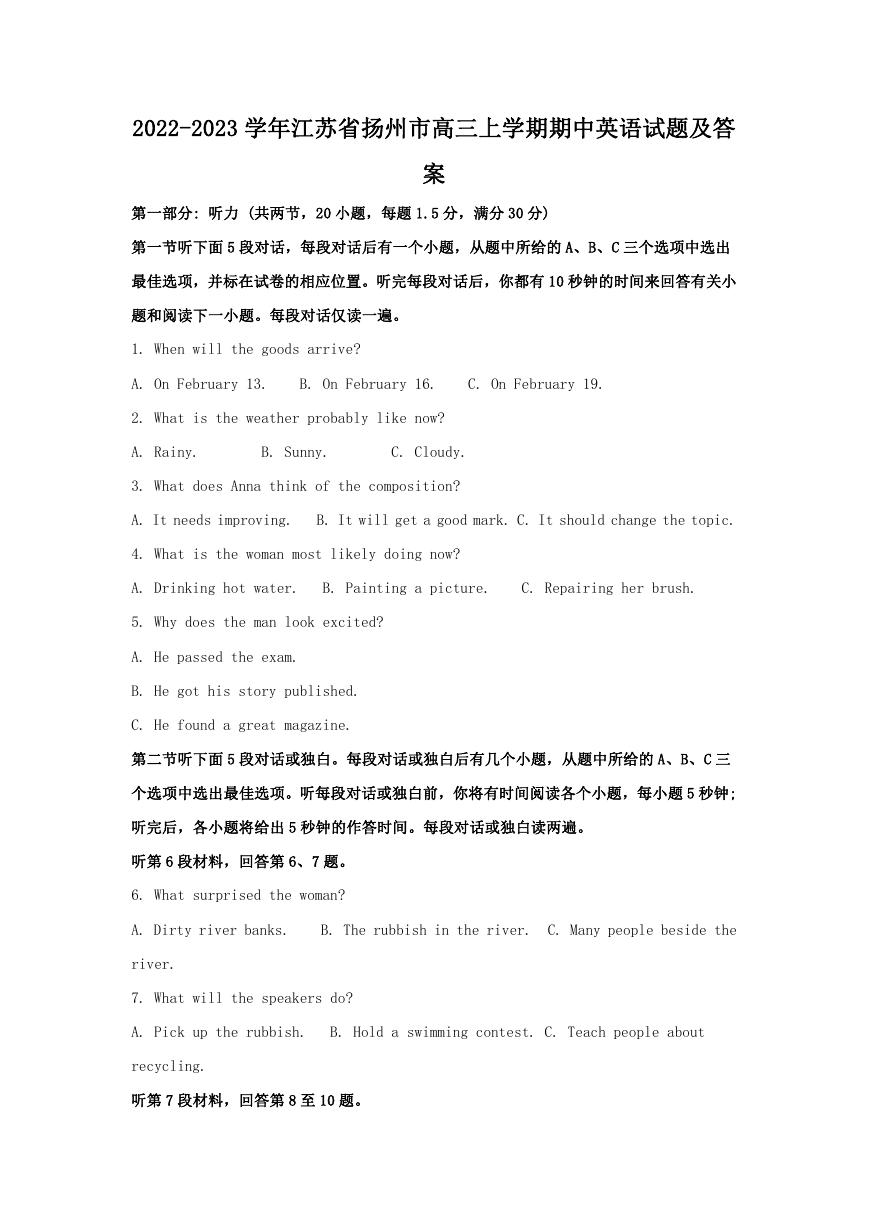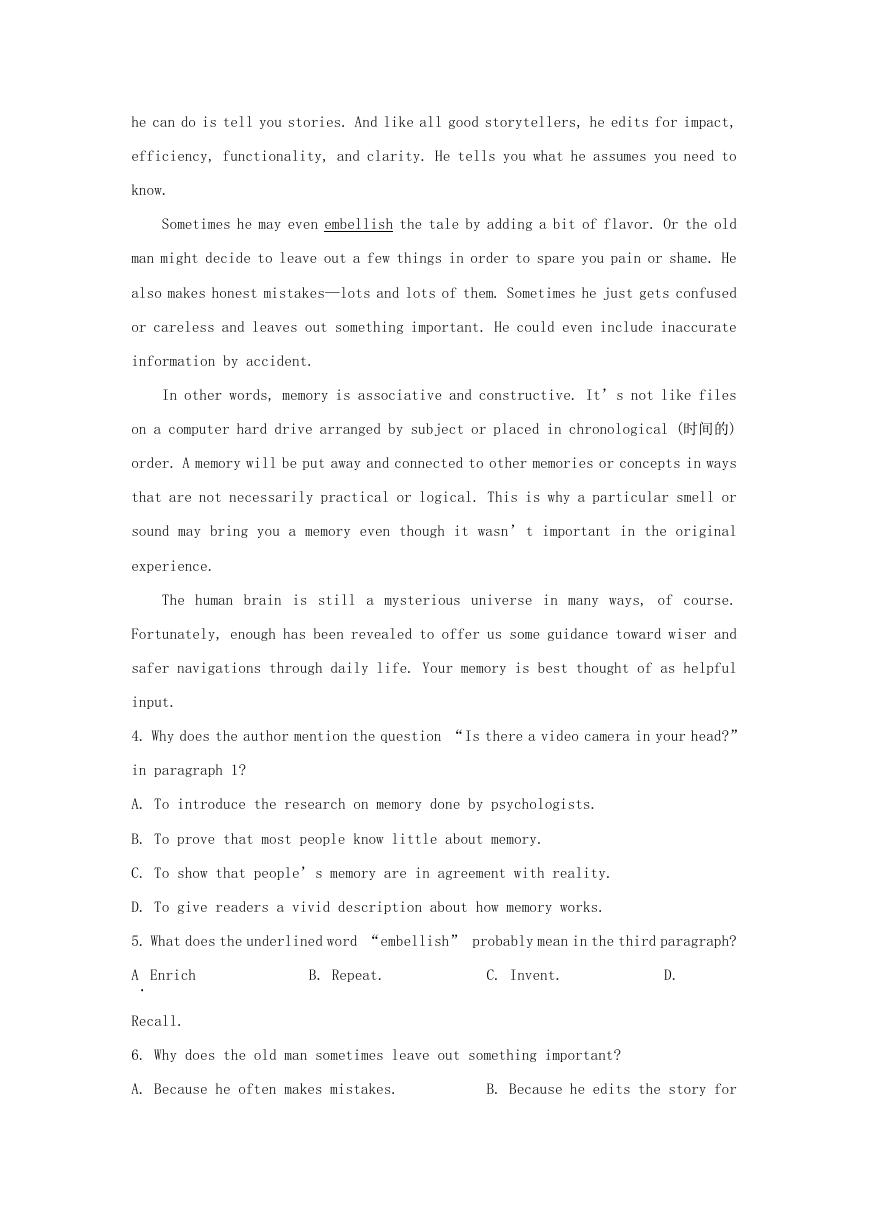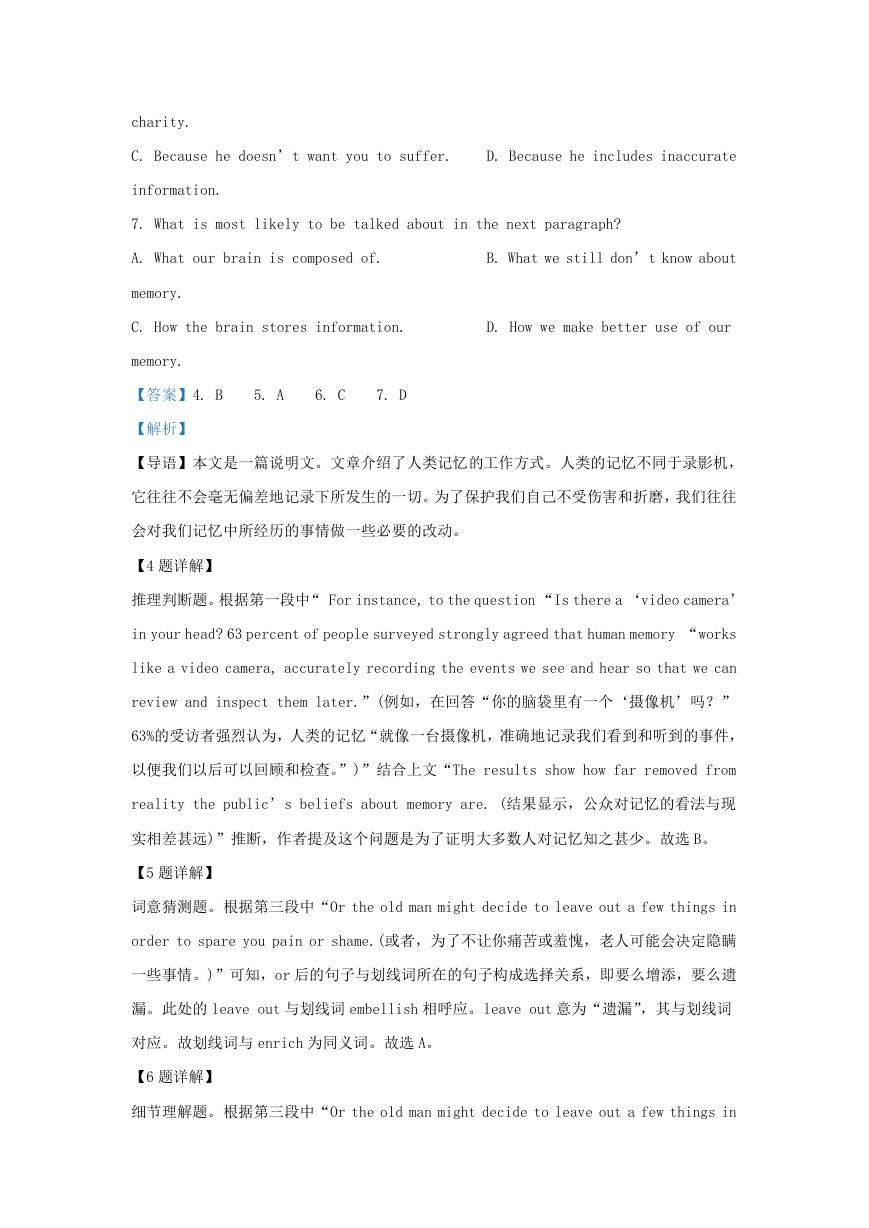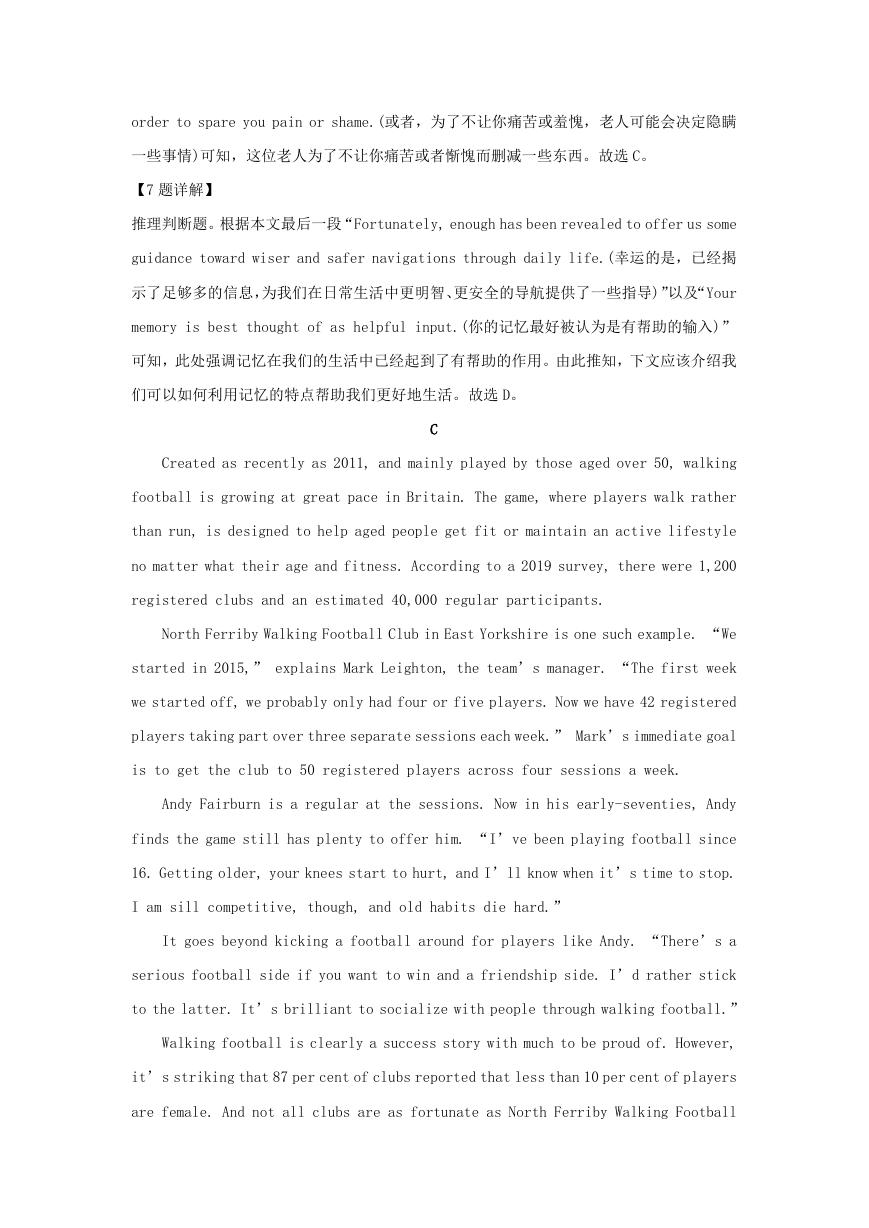2022-2023 学年江苏省扬州市高三上学期期中英语试题及答
案
第一部分: 听力 (共两节,20 小题,每题 1.5 分,满分 30 分)
第一节听下面 5 段对话,每段对话后有一个小题,从题中所给的 A、B、C 三个选项中选出
最佳选项,并标在试卷的相应位置。听完每段对话后,你都有 10 秒钟的时间来回答有关小
题和阅读下一小题。每段对话仅读一遍。
1. When will the goods arrive?
A. On February 13.
B. On February 16.
C. On February 19.
2. What is the weather probably like now?
A. Rainy.
B. Sunny.
C. Cloudy.
3. What does Anna think of the composition?
A. It needs improving.
B. It will get a good mark. C. It should change the topic.
4. What is the woman most likely doing now?
A. Drinking hot water.
B. Painting a picture.
C. Repairing her brush.
5. Why does the man look excited?
A. He passed the exam.
B. He got his story published.
C. He found a great magazine.
第二节听下面 5 段对话或独白。每段对话或独白后有几个小题,从题中所给的 A、B、C 三
个选项中选出最佳选项。听每段对话或独白前,你将有时间阅读各个小题,每小题 5 秒钟;
听完后,各小题将给出 5 秒钟的作答时间。每段对话或独白读两遍。
听第 6 段材料,回答第 6、7 题。
6. What surprised the woman?
A. Dirty river banks.
B. The rubbish in the river.
C. Many people beside the
river.
7. What will the speakers do?
A. Pick up the rubbish.
B. Hold a swimming contest. C. Teach people about
recycling.
听第 7 段材料,回答第 8 至 10 题。
�
8. Why does the woman talk to the man?
A. To ask for a job.
B. To get some advice.
C. To conduct an interview.
9. What is the man’s occupation?
A. An academic advisor.
B. A medical doctor.
C. A hospital administrator.
10. How does the woman probably feel in the end?
A. Appreciated.
B. Encouraged.
C. Disappointed.
听第 8 段材料,回答第 11 至 13 题。
11. Where are the speakers?
A. In a library.
B. In a classroom.
C. In a tree house.
12. What project is the man doing this year?
A. Making a volcano.
B. Making a phone.
C. Making a tree house.
13. What is the first prize?
A. A new calculator.
B. One hundred dollars.
C. Five hundred dollars.
听第 9 段材料,回答第 14 至 17 题。
14. What are the speakers mainly talking about?
A. When to complete the presentations.
B. How to balance work and life.
C. What to do on the weekend.
15. What is the probable relationship between the speakers?
A. Co-workers.
B. Classmates.
C. A couple.
16. What do the speakers plan to do this Saturday?
A. Go to the seaside.
B. Attend a music festival.
C. Stay at home and relax.
17. When will the speakers probably arrive at their destination?
A. At 7:00 a.m.
B. At 8:00 a.m.
C. At 8:20 a.m.
听第 10 段材料,回答第 18 至 20 题。
18. What is the purpose of the Green Team?
A. To teach healthy cooking.
B. To take care of the backyard.
C. To teach people to use natural energy.
�
19. How can food waste be reused according to the speaker?
A. By feeding it to animals.
B. By turning it into plant food.
C. By sending it to a garbage can.
20. Which item could be added to the box?
A. Potatoes.
B. Meat.
C. Eggs.
第二部分 阅读 (共两节,满分 50 分)
第一节 (共 15 小题; 每小题 2.5 分,满分 37.5 分)
阅读下列短文,从每题所给的 A、B、C、D 四个选项中选出最佳选项。
A
Ask The Expert Dr. ALEJANDRO RIVAS
Struggling to hear each day, even when using powerful hearing
aids?
Dr. ALEJANDRO RIVAS, a cochlear
(耳蜗) implant surgeon and medical
advisor to Cochlear, answers questions
about cochlear implants and how they
are different from hearing aids.
Now more than ever, communication and connection are important for maintaining
relationships with family, friends and community. Whether it happens suddenly or
gradually over time, hearing loss can affect you physically and emotionally.
Addressing your hearing loss has the potential to transform your life.
Cochlear implants work different than hearing aids. Rather than amplifying sound,
they use state-of-the-art electronic components and software to help provide access
to the sounds you have been missing.
Q: How are cochlear implants different than hearing aids?
Hearing aids help many people by making the sounds they hear louder.
Unfortunately, as hearing loss progresses, sounds may not only need to be louder,
they may need to be clearer. Cochlear implants can help give you that clarity,
�
especially in noisy environments.
Q: Are cochlear implants a proven solution?
Cochlear hearing implant technology is very reliable. In fact, it has been around
for 40 years and Cochlear has provided more than 60.0000 implantable hearing devices.
Q: Is it major surgery?
No, not at all. The procedure is often done on an outpatient basis and typically
takes just a couple of hours.
Q: Are cochlear implants covered by Medicare?
Yes. Medicare and most private insurance plans routinely cover cochlear
implants.
Call 800 610 4901 or visit www.Cochlear.us/Rdigest to find a Hearing Implant
Specialist near you and get a free guide about cochlear implants.
1. Where is this article probably taken from?
A. A textbook.
B. A blog.
C. A magazine.
D. A
diary.
2. What advantages do cochlear implants have over hearing aids?
A. They can work through software.
B. They are more reliable.
C. They can make sounds clearer.
D. They are covered by Medicare.
3. Who answers the questions in this article?
A. An outpatient of the surgery.
B. A Cochlear Implant surgeon.
C. A specialist of medical insurance.
D. A customer of Cochlear implant.
【答案】1. C
2. C
3. B
【解析】
【导语】本文是一篇广告,以医生解答咨询者问题的方式,介绍了通过耳蜗移植技术来处理
耳聋的问题。
【1 题详解】
推理判断题。根据正文第二段的“Cochlear implants work different than hearing aids.
Rather than amplifying sound, they use state-of-the-art electronic components and
�
software to help provide access to the sounds you have been missing.(人工耳蜗的
工作原理不同于助听器。它们不是放大声音,而是使用最先进的电子组件和软件来帮助你获
得你丢失的声音。)”可知,本文介绍了通过耳蜗移植技术来处理耳聋的问题,是一篇广告,
因此可能来自于杂志。故选 C。
【2 题详解】
细节理解题。根据原文中的第一个问题的回答“Hearing aids help many people by making
the sounds they hear louder. Unfortunately, as hearing loss progresses, sounds may
not only need to be louder, they may need to be clearer. Cochlear implants can help
give you that clarity, especially in noisy environments.(助听器通过使他们听到的
声音更大来帮助许多人。不幸的是,随着听力损失的发展,声音可能不仅需要更大,它们可
能需要更清楚。人工耳蜗可以帮助你获得这种清晰度,尤其是在嘈杂的环境中。)”可知,
人工耳蜗比助听器的优点在于它们可以使声音更清晰。故选 C。
【3 题详解】
细节理解题。根据第一个框里的“Ask The Expert Dr. ALEJANDRO RIVAS(问问专家 Dr.
ALEJANDRO RIVAS)”和“Dr. ALEJANDRO RIVAS, a cochlear(耳蜗) implant surgeon and
medical advisor to Cochlear(ALEJANDRO RIVAS 博士,耳蜗植入外科医生和耳蜗医疗顾问)”
可知,耳蜗植入外科医生来回答文中的问题,故选 B。
B
Most people, regardless of intelligence or education, know little about memory.
A revealing study by research psychologists Daniel Simons and Christopher Chabris
asked people simple questions about memory and then compared their answers with those
of experts in memory research. The results show how far removed from reality the
public’s beliefs about memory are. For instance, to the question “Is there a ‘video
camera’ in your head?” 63 percent of people surveyed strongly agreed that human
memory “works like a video camera, accurately recording the events we see and hear
so that we can review and inspect them later.” But none of the experts agreed that
memory works like a video camera.
So how does memory work? I prefer to describe it as something like an old man
sitting by a campfire somewhere deep in your brain. He means well and wants to help,
but he doesn’t show you your past like some wizard with a time entrance. The best
�
he can do is tell you stories. And like all good storytellers, he edits for impact,
efficiency, functionality, and clarity. He tells you what he assumes you need to
know.
Sometimes he may even embellish the tale by adding a bit of flavor. Or the old
man might decide to leave out a few things in order to spare you pain or shame. He
also makes honest mistakes—lots and lots of them. Sometimes he just gets confused
or careless and leaves out something important. He could even include inaccurate
information by accident.
In other words, memory is associative and constructive. It’s not like files
on a computer hard drive arranged by subject or placed in chronological (时间的)
order. A memory will be put away and connected to other memories or concepts in ways
that are not necessarily practical or logical. This is why a particular smell or
sound may bring you a memory even though it wasn’t important in the original
experience.
The human brain is still a mysterious universe in many ways, of course.
Fortunately, enough has been revealed to offer us some guidance toward wiser and
safer navigations through daily life. Your memory is best thought of as helpful
input.
4. Why does the author mention the question “Is there a video camera in your head?”
in paragraph 1?
A. To introduce the research on memory done by psychologists.
B. To prove that most people know little about memory.
C. To show that people’s memory are in agreement with reality.
D. To give readers a vivid description about how memory works.
5. What does the underlined word “embellish” probably mean in the third paragraph?
A. Enrich
Recall.
B. Repeat.
C. Invent.
D.
6. Why does the old man sometimes leave out something important?
A. Because he often makes mistakes.
B. Because he edits the story for
�
charity.
C. Because he doesn’t want you to suffer.
D. Because he includes inaccurate
information.
7. What is most likely to be talked about in the next paragraph?
A. What our brain is composed of.
B. What we still don’t know about
memory.
C. How the brain stores information.
D. How we make better use of our
memory.
【答案】4. B
5. A
6. C
7. D
【解析】
【导语】本文是一篇说明文。文章介绍了人类记忆的工作方式。人类的记忆不同于录影机,
它往往不会毫无偏差地记录下所发生的一切。为了保护我们自己不受伤害和折磨,我们往往
会对我们记忆中所经历的事情做一些必要的改动。
【4 题详解】
推理判断题。根据第一段中“ For instance, to the question “Is there a ‘video camera’
in your head? 63 percent of people surveyed strongly agreed that human memory “works
like a video camera, accurately recording the events we see and hear so that we can
review and inspect them later.”(例如,在回答“你的脑袋里有一个‘摄像机’吗?”
63%的受访者强烈认为,人类的记忆“就像一台摄像机,准确地记录我们看到和听到的事件,
以便我们以后可以回顾和检查。”)”结合上文“The results show how far removed from
reality the public’s beliefs about memory are. (结果显示,公众对记忆的看法与现
实相差甚远)”推断,作者提及这个问题是为了证明大多数人对记忆知之甚少。故选 B。
【5 题详解】
词意猜测题。根据第三段中“Or the old man might decide to leave out a few things in
order to spare you pain or shame.(或者,为了不让你痛苦或羞愧,老人可能会决定隐瞒
一些事情。)”可知,or 后的句子与划线词所在的句子构成选择关系,即要么增添,要么遗
漏。此处的 leave out 与划线词 embellish 相呼应。leave out 意为“遗漏”,其与划线词
对应。故划线词与 enrich 为同义词。故选 A。
【6 题详解】
细节理解题。根据第三段中“Or the old man might decide to leave out a few things in
�
order to spare you pain or shame.(或者,为了不让你痛苦或羞愧,老人可能会决定隐瞒
一些事情)可知,这位老人为了不让你痛苦或者惭愧而删减一些东西。故选 C。
【7 题详解】
推理判断题。根据本文最后一段“Fortunately, enough has been revealed to offer us some
guidance toward wiser and safer navigations through daily life.(幸运的是,已经揭
示了足够多的信息,为我们在日常生活中更明智、更安全的导航提供了一些指导)”以及“Your
memory is best thought of as helpful input.(你的记忆最好被认为是有帮助的输入)”
可知,此处强调记忆在我们的生活中已经起到了有帮助的作用。由此推知,下文应该介绍我
们可以如何利用记忆的特点帮助我们更好地生活。故选 D。
C
Created as recently as 2011, and mainly played by those aged over 50, walking
football is growing at great pace in Britain. The game, where players walk rather
than run, is designed to help aged people get fit or maintain an active lifestyle
no matter what their age and fitness. According to a 2019 survey, there were 1,200
registered clubs and an estimated 40,000 regular participants.
North Ferriby Walking Football Club in East Yorkshire is one such example. “We
started in 2015,” explains Mark Leighton, the team’s manager. “The first week
we started off, we probably only had four or five players. Now we have 42 registered
players taking part over three separate sessions each week.” Mark’s immediate goal
is to get the club to 50 registered players across four sessions a week.
Andy Fairburn is a regular at the sessions. Now in his early-seventies, Andy
finds the game still has plenty to offer him. “I’ve been playing football since
16. Getting older, your knees start to hurt, and I’ll know when it’s time to stop.
I am sill competitive, though, and old habits die hard.”
It goes beyond kicking a football around for players like Andy. “There’s a
serious football side if you want to win and a friendship side. I’d rather stick
to the latter. It’s brilliant to socialize with people through walking football.”
Walking football is clearly a success story with much to be proud of. However,
it’s striking that 87 per cent of clubs reported that less than 10 per cent of players
are female. And not all clubs are as fortunate as North Ferriby Walking Football
�
















 2023年江西萍乡中考道德与法治真题及答案.doc
2023年江西萍乡中考道德与法治真题及答案.doc 2012年重庆南川中考生物真题及答案.doc
2012年重庆南川中考生物真题及答案.doc 2013年江西师范大学地理学综合及文艺理论基础考研真题.doc
2013年江西师范大学地理学综合及文艺理论基础考研真题.doc 2020年四川甘孜小升初语文真题及答案I卷.doc
2020年四川甘孜小升初语文真题及答案I卷.doc 2020年注册岩土工程师专业基础考试真题及答案.doc
2020年注册岩土工程师专业基础考试真题及答案.doc 2023-2024学年福建省厦门市九年级上学期数学月考试题及答案.doc
2023-2024学年福建省厦门市九年级上学期数学月考试题及答案.doc 2021-2022学年辽宁省沈阳市大东区九年级上学期语文期末试题及答案.doc
2021-2022学年辽宁省沈阳市大东区九年级上学期语文期末试题及答案.doc 2022-2023学年北京东城区初三第一学期物理期末试卷及答案.doc
2022-2023学年北京东城区初三第一学期物理期末试卷及答案.doc 2018上半年江西教师资格初中地理学科知识与教学能力真题及答案.doc
2018上半年江西教师资格初中地理学科知识与教学能力真题及答案.doc 2012年河北国家公务员申论考试真题及答案-省级.doc
2012年河北国家公务员申论考试真题及答案-省级.doc 2020-2021学年江苏省扬州市江都区邵樊片九年级上学期数学第一次质量检测试题及答案.doc
2020-2021学年江苏省扬州市江都区邵樊片九年级上学期数学第一次质量检测试题及答案.doc 2022下半年黑龙江教师资格证中学综合素质真题及答案.doc
2022下半年黑龙江教师资格证中学综合素质真题及答案.doc